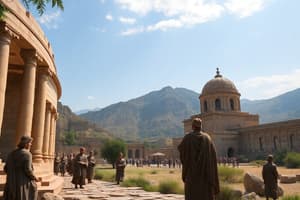Podcast
Questions and Answers
What is the main focus of the study of history?
What is the main focus of the study of history?
- Promotion of a specific ideology
- Understanding past events and human behavior (correct)
- Analysis of contemporary events
- Collection of modern documents
Which period is characterized by the emergence of writing around 3000 BC?
Which period is characterized by the emergence of writing around 3000 BC?
- Prehistoric Era
- Ancient History (correct)
- Middle Ages
- Renaissance
What method focuses on examining themes across different historical periods?
What method focuses on examining themes across different historical periods?
- Comparative Method
- Chronological Method
- Analytical Method
- Thematic Method (correct)
Who is often referred to as the 'Father of History'?
Who is often referred to as the 'Father of History'?
Which era followed the fall of the Western Roman Empire around 476 AD?
Which era followed the fall of the Western Roman Empire around 476 AD?
What is a primary source in history?
What is a primary source in history?
What challenge does bias in historical sources present?
What challenge does bias in historical sources present?
What aspect of history does historiography focus on?
What aspect of history does historiography focus on?
Flashcards are hidden until you start studying
Study Notes
Definition of History
- The study of past events, particularly in human affairs.
- Involves the analysis of historical sources and interpretations.
Importance of History
- Helps understand human behavior and societal changes.
- Provides context for current events and future predictions.
- Fosters critical thinking and analytical skills.
Major Historical Periods
-
Prehistoric Era
- Before written records.
- Study of artifacts and oral traditions.
-
Ancient History
- Emergence of writing (c. 3000 BC).
- Civilizations such as Mesopotamia, Egypt, Greece, and Rome.
-
Middle Ages
- Fall of the Western Roman Empire (c. 476 AD) to the Renaissance (c. 1500 AD).
- Feudalism, the spread of Christianity, and the Islamic Golden Age.
-
Renaissance
- Cultural revival in Europe (14th-17th centuries).
- Advancements in art, science, and humanism.
-
Modern Era
- Industrial Revolution (18th-19th centuries).
- World Wars, Cold War, and the development of contemporary global politics.
Key Concepts in History
-
Historical Sources
- Primary: Original documents, artifacts, diaries, etc.
- Secondary: Analyses and interpretations of primary sources.
-
Historiography
- The study of how history is written and interpreted.
- Different perspectives shaped by culture, time, and ideology.
Major Historical Methods
- Chronological: Arranging events in the order they occurred.
- Thematic: Focusing on particular themes or issues across different time periods.
- Comparative: Analyzing similarities and differences between different societies or events.
Notable Historians
- Herodotus: Often called the "Father of History."
- Thucydides: Focused on the Peloponnesian War; emphasized critical analysis.
- Leopold von Ranke: Advocated for rigor and objectivity in historical research.
Challenges in History
- Bias in historical sources and interpretations.
- The incomplete or lost records leading to gaps in knowledge.
- The influence of present-day perspectives on historical understanding.
Definition of History
- Study of past events, particularly focused on human affairs.
- Involves analysis of both historical sources and interpretations to draw conclusions.
Importance of History
- Aids in understanding human behavior and the evolution of societies.
- Provides critical context for current events, aiding in future predictions.
- Encourages the development of critical thinking and analytical skills.
Major Historical Periods
- Prehistoric Era
- Characterized by the absence of written records; knowledge gained from artifacts and oral traditions.
- Ancient History
- Begins around 3000 BC with the advent of writing; includes civilizations like Mesopotamia, Egypt, Greece, and Rome.
- Middle Ages
- Spans from the fall of the Western Roman Empire circa 476 AD to the Renaissance around 1500 AD, marked by feudalism, Christianity's spread, and the Islamic Golden Age.
- Renaissance
- Cultural revival in Europe occurring from the 14th to the 17th century, noted for advancements in art, science, and the philosophy of humanism.
- Modern Era
- Includes the Industrial Revolution in the 18th-19th centuries; encompasses World Wars, the Cold War, and growth of contemporary global political structures.
Key Concepts in History
- Historical Sources
- Primary sources include original documents, artifacts, and personal diaries; secondary sources consist of analyses of primary materials.
- Historiography
- The study of how history is written and interpreted, influenced by various cultural, temporal, and ideological perspectives.
Major Historical Methods
- Chronological Method
- Arranges historical events in the order they occurred.
- Thematic Method
- Concentrates on specific themes or issues across various time periods.
- Comparative Method
- Examines similarities and differences among societies or specific events.
Notable Historians
- Herodotus
- Regarded as the "Father of History" for his narrative style and inquiry into past events.
- Thucydides
- Focused on the analysis of the Peloponnesian War, emphasizing the importance of critical examination in historical study.
- Leopold von Ranke
- Promoted rigor and objectivity in historical research, changing how history is approached.
Challenges in History
- Presence of bias in historical sources and interpretations, affecting credibility.
- Gaps in knowledge due to incomplete or lost historical records.
- Current perspectives can heavily influence the understanding and interpretation of historical contexts.
Studying That Suits You
Use AI to generate personalized quizzes and flashcards to suit your learning preferences.




